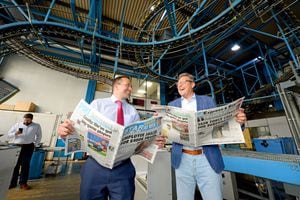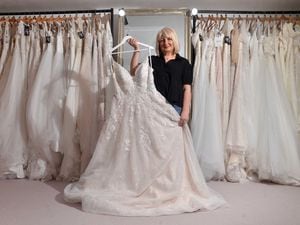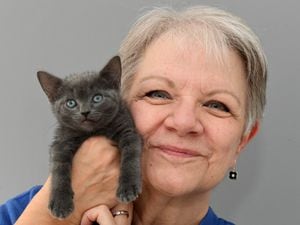National Lottery 25 years on
'It could be you', was the advertising slogan. And when Noel Edmonds drew the first National Lottery balls on live television, it turned out that it was a lot more people than anybody had been expecting.

It turned out there were 1,152,611 winners of the first lottery draw, sharing a prize fund of just over £22 million between them. So great was the number winners, that the jackpot estimate had to be downgraded from £6.9 million to £5.9 million, although it did mean that seven lucky punters went home with a shade under £840,000 each.
Tomorrow marks 25 years since the launch of the first National Lottery draw, and the hype leading up to the event could scarcely have been greater. Television commercials, newspaper ads, and wall-to-wall news coverage meant it was the subject on everybody's lips as 49 million people bought tickets in the five-day run-up to the draw. One tabloid hack even changed his name by deed poll to Lenny Lottery, while prime minister John Major – a man not exactly noted for good luck during his time in office – was pictured buying a ticket.
Since its launch on November 19, 1994, the National Lottery has created 5,500 millionaires across the UK, and has handed out £71 billion in prize money. A further £40 billion has been handed over to good causes, and it continues to raise £30 million every week.
But while the basic principle remains the same, the lottery has seen many changes over the past quarter of a century.
Nigel Railton, chief executive of lottery operator Camelot, says one of the biggest differences is the variety of different games on offer.
"Back in 1994, the National Lottery had just one game," he says. "Now it offers six draw-based games, as well as a wide range of in-store scratch-cards and online instant win games.
"This evolution in terms of our product range has been key to lottery’s ongoing success. Just like any other business, you can’t stand still, you need to keep coming up with new ways to keep your product offering fresh and appealing."
Back in 1994, few people had even heard of the internet, but today more than a quarter of all tickets are bought this way, accounting for £1.8 billion last year. Mr Railton says this has definitely been a change for the better.
"It's helped us grow sales and that's great news as it means more money is raised for good causes," he says.
"We've come a long way since we first started selling lottery tickets online in 2003.
"We now operate Europe's largest online lottery in terms of sales, and with six million active registered players we have one of the top e-commerce sites in the UK."
Mr Railton adds that more than half of all online sales come through smartphones or tablets, emphasising the importance to some customers of being able to buy tickets wherever they, whatever the time of day.
More controversial has been the growth of what Mr Railton describes as 'synthetic' national lotteries, society lotteries which operate on a similar scale to the National Lottery, but benefit from generous tax allowances originally intended for small local lotteries.
"We're not talking about the hundreds of traditional society lotteries with whom we've happily co-existed since 1994," says Mr Railton.
"They do a fantastic job raising funds for local causes and we look forward to seeing them thrive in the years to come."
But he says that when the National Lottery was set up, the whole purpose was to create a single national lottery, which had been identified as the most efficient way to maximise returns to society.
"However, the emergence in recent years of ‘synthetic’ national lotteries – society lotteries that operate on a national scale and compete directly with The National Lottery, contrary to the original intention of Parliament – is eroding this model. He singles out the People’s Postcode Lottery and the Health Lottery which have become household names in their own right.
"Unlike Camelot, which must pay 12 per cent lottery duty on gross ticket sales to the Government and is restricted under its licence in terms of how much it can spend on marketing, synthetic national lottery operators are exempt from paying tax on ticket sales and are free to spend significantly more on promoting their products.
"The National Lottery is therefore having to compete with these companies on a playing field that is far from level – putting future National Lottery returns to good causes, society and the Government at risk." Mr Railton calls for tighter regulation of these new lotteries which he says is necessary to ensure a level playing field.
The National Lottery saw its one and only price increase in 2013, when the cost of a standard 'Lotto' ticket doubled from £1 to £2. At the time the decision was met with a somewhat mixed reaction from punters, but Mr Railton says there was really very little option but to restructure the way the main lottery game was played.
"How many other products can you name that cost the same today as they did in 1994?," he asks.
Mr Railton points out that the 2013 price increase related only to the Lotto game, which at the time had been suffering from declining sales.
"While overall National Lottery sales had been increasing, sales of Lotto had been declining for a number of years," he says.
"We therefore decided to stimulate player interest with new prizes and more ways to win, all of which were made possible by changing the price of the game for the first time since 1994."
He says the changes successfully increased the amount of revenue raised, with more money going to both players and good causes than before the revamp.
He says a number of further changes have taken place in the six years since, including the introduction of bigger fixed prizes, including £1 million for matching five main numbers and the bonus ball.
"Jackpot ‘rolldowns’, where all cash prizes are boosted in ‘Must Be Won’ draws when the jackpot is not won, are delivering some fantastic results for both players and good causes," he adds.
"And that’s what the National Lottery is all about."





